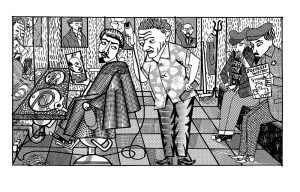Promoting physical fitness, the left has developed a bracing set of competitive callisthenics. Participants vie over who can complete a marathon crawl on the belly like a reptile, who can flop onto the floor in a pose of the greatest prostration, and who can bend over the farthest, pants down, while begging to have large pieces of furniture shoved up the backside. Athletic displays of public remorse also constitute an increasingly popular spectator sport.
The young American poet Anders Carlson–Wee was excited at first about getting ‘How-To’ published in a July issue of the Nation, a storied New Statesman-style weekly. The poetry I read in a year would fit on a cereal box — it’s not my form — but I still think, for a short 14-liner, ‘How-To’ is nicely done. You don’t need a doctorate in postmodernism to discern that the poem is sympathetic to the homeless. Its point is also apparent: to get passers-by to tithe, a homeless person has to flatter the targets’ moral vanity. The poem ends with advising panhandlers, ‘It’s about who they believe/they is. You hardly even there.’
Alas, because Carlson-Wee is not personally homeless, disabled, or black — not that it should matter, but the implied persona in the poem doesn’t specifically feign to be any of these things — the comments went for his throat. ‘This makes me super uneasy. Do foks [sic] know the Nation doesn’t publish actual disabled people?’ ‘Whether it’s blackface or a poor white dialect, I don’t think this persona is yours to assume… I find the poem pretty offensive.’ ‘THE LAST THING AMERICA NEEDS IS A 21st CENTURY WHITE WHITMAN.’ Even more inane? ‘This also reads like thinly veiled white male scorn of poets who get “handouts” in the literary world by foregrounding their identity and hardship.’
Yet rather than shrug off this highly creative interpretation of his work, our young aspirant posted a passionate apology. ‘I am listening closely and I am reflecting deeply. I am sorry for the pain I have caused… Treading anywhere close to blackface is horrifying to me and I am profoundly regretful. The fact that I did not foresee this reading of the poem … is humbling and eye-opening. I am beginning a process of talking to people and re-evaluating what it means to make art in this world from a place of privilege…’
More distressing than the author’s self-abasement was the magazine’s. For the Nation, too, ran a nauseously grovelling apology. The editors confessed to making a ‘serious mistake’ in running a poem with ‘disparaging and ableist language that has given offence and caused harm to members of several communities’. Regretting ‘the pain’ they have caused (some day we really must address this transparently fake version of ‘pain’), the editors disavow their originally halfway intelligent reading of the work. Typically, they thank their own rabid detractors: ‘We are grateful for the insightful critiques we have heard, but we know that the onus of change is on us… In the end, this decision means that we need to step back and look at not only our editing process, but at ourselves as editors.’
Taking it up the bum when called out has become standard left-wing protocol. Last month, in the Tin House summer writers’ workshop in Oregon — which was, according to a New York Times podcast, ‘super gay, super brown, super black!’ — the writer Wells Tower horrified his audience by reading from an essay published in Harper’s in 2010. ‘Own Goal’ is also about the homeless — which makes you wonder if literary writers might be safer going back to ignoring those with no fixed abode like everyone else. I’ve read the essay — pretty tame — but it does quote men who haven’t gone to progressive charm school. What seemed to offend the Times podcaster even more than the ‘heinous, misogynistic stuff’ was the boisterous spirit in which Tower delivered the dialogue (‘very Hunter S. Thompson-inspired William Burroughs’). Ergo, members of Tower’s audience marched out because he read the essay too well.
You can guess the upshot. Despite that Tower was reading non-fiction — dialogue he merely recorded — the following day, the author apologised to the entire ‘community’. I wish I’d been there, if only to have found out: apologised for what? Progressive confessions grow only more fervent when no one’s done anything wrong.
Amply on display throughout #MeToo, this penitent tradition might seem to have its roots in the flamboyant repentance of sin of Midwestern revivalism, à la Elmer Gantry. More ominously, its texture is Soviet. Dissidents in the USSR were often called upon to publicly recant deviant views. But the pejorative ‘Soviet’ packs little punch for ‘I’m a communist, stupid’ activists who think a ‘gulag’ is a yoghurt drink at Nando’s.
Are these recitals of the mea culpa mambo sincere or strategic? Either way, unless merely another form of showing off, sweaty performances of contrition for minor infractions of left-wing catechism appear based in fear. Fear of expulsion from the faithful — although being ostracised by such a humourless crowd would seem to be doing apostates a favour. Yet the fear is also of more palpable consequences. Pariah status could translate into being banned from publishing in a left–leaning literary landscape. Academics are afraid of being sacked.
Few fight their corners any more. By consensus, standing up to a stampeding digital mob is like remaining upright in the midst of a wildebeest migration. Better to cower in the dirt and let the hooves kick over you. Better still, participate in your own abuse. Outdo your attackers with self-criticism. If you can’t beat them, join them beating you.
The irony? All the institutional bending over regarding ‘How-To’ didn’t stop a California professor from railing in response, ‘All of us in the literary community must DEMAND that white editors resign. It’s time to STEP DOWN and hand over the positions of power.’ See, no self–humiliation, no rending of garments, is ever enough. The apologies don’t even work. The lesson is clear. Unless you’ve actually done something wrong, hold your ground, and keep your dignity.


















